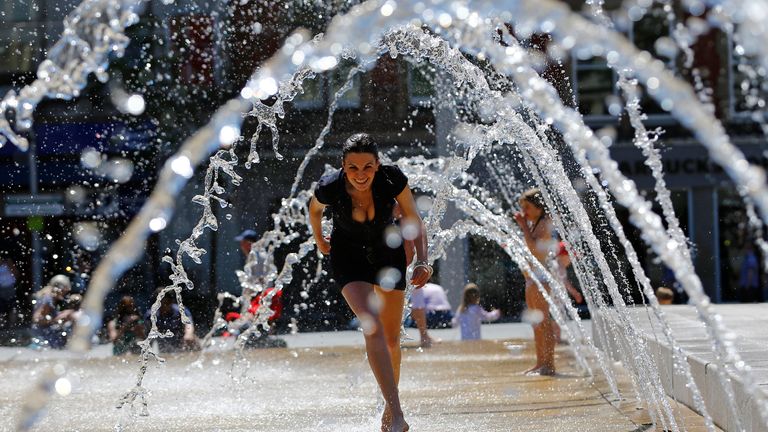Heatwaves: UK lives at risk from 'dangerous perception gap' - Red Cross climate change warning
Many Britons see heatwaves in a positive light and a problem for the future - despite them linked with more than 2,000 excess deaths last summer, the charity says.
Tuesday 27 July 2021 09:45, UK
The danger from heatwaves is not being matched by the level of public concern, the British Red Cross has said, as it warns of a "dangerous perception gap in the UK when it comes to the public's awareness of the risk of heat".
The charity has sounded the alarm in a new report assessing how prepared the UK public is for rising temperatures.
There were a record 2,556 excess deaths from heat last summer, and a predicted 7,000 people could die from heat every year by 2050.
Yet Britons see the word "heatwave" in a positive light, associating it with good weather, with more than a third (37%) believing that heatwaves will be a problem in the future, not now.
The poll of 2,000 people for the report found many in high-risk groups, such as the over-75s, don't perceive themselves to be especially vulnerable.
The report follows a recent warning from the Climate Change Commitee (CCC) that criticised the government for allowing more than half a million (570,000+) new homes to be been built without features to cope with higher temperatures.
Chris Stark, chief executive of the CCC, said: "This report should serve as a call to arms to start building and adapting our homes, hospitals, care homes, offices, infrastructure and transport networks to minimise the risk."
He called for a public awareness campaign and said improving access to green space in urban areas would also help "but instead, our parks and recs are in decline".
"Nobody should lose their life as a result of extreme heat; if we take steps now to educate and adapt we'll have a better chance of avoiding worse problems further down the track," he said.
Last week the Met Office issued its first ever extreme heat warning for the UK, designed to put the dangers of rising temperatures onto everyone's radar.
Met Office head of civil contingencies Will Lang said: "As a result of climate change, heatwaves are becoming longer and more extreme, and many people's health and wellbeing will continue to suffer as a result.
"With more hot conditions likely this summer, it is so important that the public understands the risks that heatwaves can bring, and to improve awareness of heat risk among the general public and also ensure that advice and support reaches the most vulnerable ahead of a heatwave."
Though not deadly for all, heatwaves can also exacerbate underlying health conditions, such as kidney and heart disease. They can also trigger drought, as experienced in West Sussex last year.
The British Red Cross urges the public to keep informed by following weather alerts, knowing who is at risk and keeping up with any medication.
The charity advises people should avoid excess alcohol during a heatwave, limit strenuous physical activity, take a cold bath or shower to cool down and wear light-weight loose-fitting clothes.
To keep homes cooler, it suggests covering windows from sunlight and opening windows when the air feels cooler outside.
Subscribe to ClimateCast on Spotify, Apple Podcasts, or Spreaker.
Sky News has launched the first daily prime time news show dedicated to climate change.
The Daily Climate Show is broadcast at 6.30pm and 9.30pm Monday to Friday on Sky News, the Sky News website and app, on YouTube and Twitter.
Hosted by Anna Jones, it follows Sky News correspondents as they investigate how global warming is changing our landscape and how we all live our lives.
The show also highlights solutions to the crisis and how small changes can make a big difference.






